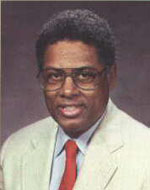|
|
Thomas Sowell
 A rush to rhetoric
A rush to rhetoric
As the investigation of Bill Clinton goes on, we are being increasingly warned against a "rush to judgment" and told to preserve "the presumption of innocence."
I do not recall any such warnings in the media back during the Watergate era. As more and more information came out suggesting that something illegal had been done by President Nixon, people simply said that this information suggested that something illegal had been done by President Nixon.
We saved "the presumption of innocence" for the courtroom -- which is where it belongs. No one said that public discussion and comment should be silenced until a court of law reached a verdict. Nor would that have made any more sense then than it does now.
In reality, no court of law ever convicted Richard Nixon of anything. Nor did Congress impeach him. What drove him from office was precisely the rising chorus of outraged opinion that increasingly concluded that he had committed illegal acts and lied about them to the public.
It was this public opinion -- not legal proof of anything -- that made impeachment virtually inevitable if Nixon had tried to remain in office. But none of this would have happened if we had listened to the kind of rush to rhetoric that tells us today that we should not "rush to judgment" and should preserve "the presumption of innocence."
Should we all have sat still like the monkeys who see no evil, hear no evil and speak no evil?
What is far more scary than anything Bill Clinton has done, or
has been
accused of doing, is the ease with which rhetoric can distract our
attention
from it and lead us off on a tangent. Three years from now, Clinton will
be
gone but what will be left behind is the knowledge of how easy it is to
get
away with flouting both the laws of the country and the simplest rules
of
common decency, if you know which rhetorical buttons to push and what
words
to
spin.
been
accused of doing, is the ease with which rhetoric can distract our
attention
from it and lead us off on a tangent. Three years from now, Clinton will
be
gone but what will be left behind is the knowledge of how easy it is to
get
away with flouting both the laws of the country and the simplest rules
of
common decency, if you know which rhetorical buttons to push and what
words
to
spin.
If Clinton gets away with all this, others will do the same -- or worse. The Roman Empire could not survive the constant erosion of its moral standards and neither can we.
A chorus of "So what?" from Congressional Democrats as evidence of the Clintons' shady dealings came out during investigations of Whitewater, travelgate and filegate got Bill and Hillary through all these scandals. Sweeping declarations that "everybody does it" allowed others to turn a blind eye.
It so happens that everybody does not do it. But, if enough people keep repeating this pat phrase to excuse their own laziness, the time will surely come when everybody does do it, because there will be no penalty for getting caught -- not even a political penalty of losing public support.
Equally lazy and equally dangerous is the notion that "the presumption of innocence" applies outside the courtroom. The standards required to convict someone in a court of law have nothing to do with public discussion of the weight of evidence.
Even in a court of law, there are different standards for different things. A "preponderance of evidence" is sufficient in a civil case but "beyond a reasonable doubt" is required in a criminal case. The mere appearance of a conflict of interest is enough for a judge to recuse himself from a particular case.
Perhaps it is too much to expect, after years of dumbing down in our public schools, that people will think about specific contexts, instead of mindlessly repeating rhetoric. The context of a courtroom proceeding is entirely different from the context in which political judgments are made.
Different contexts mean different standards. Outside the courtroom, we are talking about whether the country or the president should be given the benefit of the doubt.
Since the country and its standards are far more important, it was right that Richard Nixon had to resign the highest office in the land, without a single thing having been proved against him in a court of law.
Regardless of what does or does not happen to Bill Clinton, we are in big trouble if we allow the spin-masters to confuse us into thinking that no one should be punished for what someone else has done before. Everything from jay- walking to genocide has been done before.
We may as well stop punishing anyone for anything if that is our
standard.
Indeed, we would have no reason to vote against anyone who does not come
up
with a sin that is truly